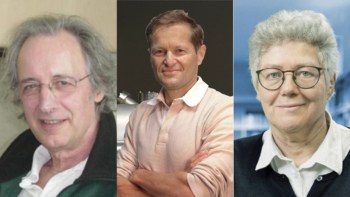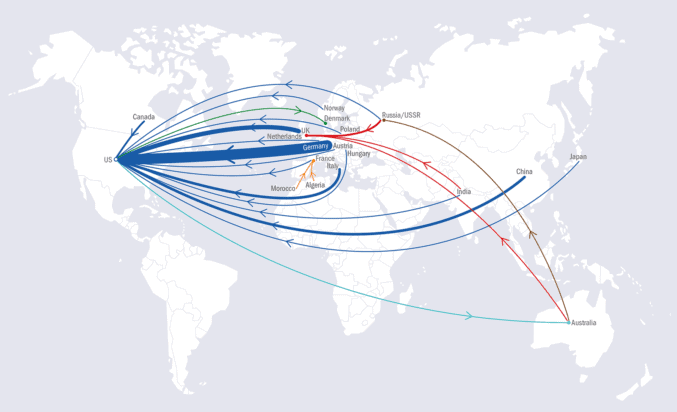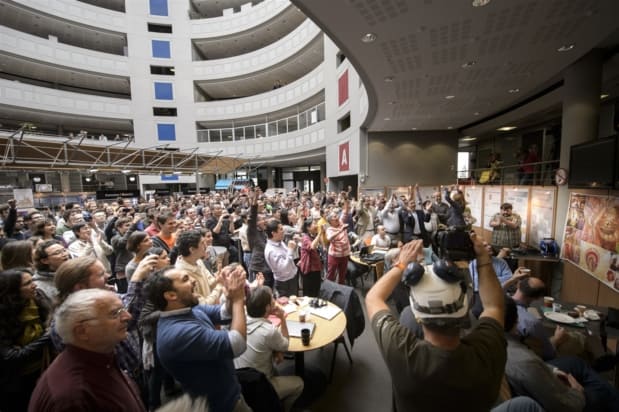

The Nobel Prize for Physics is awarded every year to up to three scientists who have made significant contributions to the field. Selected by the Royal Swedish Academy of Sciences, laureates have included some of the biggest names in the physics – from Marie Curie to Albert Einstein. Here, we highlight the work of recent winners, examine what happens behind the scenes, and pick out some who were overlooked for the prize.

Updated infographics chart the global flow of elite physicists since 1901
Study finds that five fields have accounted for more than half of Nobel prizes
 Read article: How are winners of the Nobel Prize for Physics selected?
Read article: How are winners of the Nobel Prize for Physics selected?
A brief introduction to the process and the different people involved
 Read article: Inside the Nobels: Lars Brink reveals how the world’s top physics prize is awarded
Read article: Inside the Nobels: Lars Brink reveals how the world’s top physics prize is awarded
All of us dream of receiving a Nobel Prize for Physics. We explain how the winners are chosen

Nothing says celebration quite as well as free ebooks! Join us as we commemorate 10 years of publishing quality, innovative and ground-breaking books for the physical sciences. And enter our quiz to win one of ten ebooks every month.
 Read article: Donna Strickland gives inside story of her Nobel-prize-winning research
Read article: Donna Strickland gives inside story of her Nobel-prize-winning research
University of Waterloo physicist speaks at special lecture at the Institute of Physics headquarters in London
 Read article: Roger Penrose discusses his career in mathematical physics
Read article: Roger Penrose discusses his career in mathematical physics
The future Nobel laureate spoke with Physics World at the 100 Years of General Relativity event in 2015
 Read article: Celebrating the complexity Nobel prize with perspectives on the future of the field
Read article: Celebrating the complexity Nobel prize with perspectives on the future of the field
Collection includes an exclusive interview with Nobel laureate Giorgio Parisi
 Read article: Rainer Weiss: 50 years of LIGO and gravitational waves
Read article: Rainer Weiss: 50 years of LIGO and gravitational waves
Nobel-prize-winning physicist Rainer Weiss talks with Sidney Perkowitz about his life and work, including his role in the advent of gravitational-wave astronomy
 Read article: James Peebles: a life in cosmology
Read article: James Peebles: a life in cosmology
Nobel laureate and cosmologist James Peebles from Princeton University on winning the prize, cosmological models and his new book
 Read article: Didier Queloz: the Nobel laureate searching for new worlds
Read article: Didier Queloz: the Nobel laureate searching for new worlds
Nobel laureate Didier Queloz on winning the award and the next step for exoplanet research
Runaway prices almost prevented Otto Stern from doing a seminal quantum experiment
The 2013 physics prize for the Higgs boson illustrates a big challenge facing the Nobel committee
We are keen on condensed matter and optical physics this year, or perhaps quantum
 Read article: Physicist Narges Mohammadi awarded Nobel Peace Prize for human-rights work
Read article: Physicist Narges Mohammadi awarded Nobel Peace Prize for human-rights work
Mohammadi bagged the award “for her fight against the oppression of women in Iran and her fight to promote human rights and freedom for all"
 Read article: Breaking boundaries: how erstwhile physics teacher Alexandr Solzhenitsyn won the Nobel Prize for Literature
Read article: Breaking boundaries: how erstwhile physics teacher Alexandr Solzhenitsyn won the Nobel Prize for Literature
Hamish Johnston looks at the small but important role physics played in the life of the Russian author and dissident
 Read article: Breaking boundaries: how physicists won the Nobel Prize for Physiology or Medicine
Read article: Breaking boundaries: how physicists won the Nobel Prize for Physiology or Medicine
Tami Freeman examines two medical imaging breakthroughs that led to physicists winning the Nobel Prize for Physiology or Medicine
 Read article: Breaking boundaries: how the nuclear physicist Joseph Rotblat won the Nobel Peace Prize
Read article: Breaking boundaries: how the nuclear physicist Joseph Rotblat won the Nobel Peace Prize
Michael Banks examines the life of the Nobel Peace Prize laureate Joseph Rotblat
 Read article: Breaking boundaries: how the physicist Ernest Rutherford won the Nobel Prize for Chemistry
Read article: Breaking boundaries: how the physicist Ernest Rutherford won the Nobel Prize for Chemistry
Matin Durrani explores why the great New Zealand physicist was made a chemistry Nobel laureate
 Read article: Breaking boundaries: physicist bags 2022 economics Nobel
Read article: Breaking boundaries: physicist bags 2022 economics Nobel
Philip Dybvig dabbled in physics as an undergraduate

Should ATLAS, CMS and LHC physicists have shared some of the 2013 prize?
Disciplinary bias and a stew of other prejudices helped deny the physicist Lise Meitner a share of the 1944 Nobel Prize for Chemistry
 Read article: Overlooked for the Nobel: Chien-Shiung Wu
Read article: Overlooked for the Nobel: Chien-Shiung Wu
Should Chien-Shiung Wu have shared the 1957 Nobel prize for her measurement of parity violation?
 Read article: Overlooked for the Nobel: Nicola Cabibbo
Read article: Overlooked for the Nobel: Nicola Cabibbo
Could the Nobel committee have included Nicola Cabibbo for the 2008 prize?